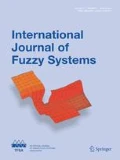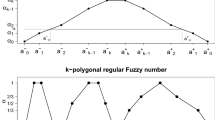Abstract
In conventional cost efficiency models, input and output data and their corresponding input prices are fundamentally known for each decision-making unit. However, the observed values of the input and output data in real problems are sometimes imprecise. This study shows that the cost efficiency evaluation method can be improved to account for situations where input–output data and their corresponding input prices are fuzzy numbers. A new fuzzy cost-minimizing model known as a possibilistic linear programming problem is proposed to evaluate the cost efficiency. In this model data information is considered as triangular fuzzy numbers. Using the \(\alpha\)-level-based approach, the model is transformed into an interval programming problem which is solved as a crisp parametric linear programming model. In addition, new definitions of the fuzzy cost efficiency and cost efficient unit are suggested. Finally, a numerical example is presented to illustrate the proposed method.
Similar content being viewed by others
References
Agarwal, S.: Efficiency measure by fuzzy data envelopment analysis model. Fuzzy Inf. Eng. 6(1), 59–70 (2014)
Bagherzadeh Valami, H.: Cost efficiency with triangular fuzzy number input prices: an application of DEA. Chaos Solitons Fractals 42(3), 1631–1637 (2009)
Chen, C.B., Klein, C.M.: A simple approach to ranking a group of aggregated fuzzy utilities. IEEE Trans. Syst., Man, Cybern., Part B (Cybern.) 27(1), 26–35 (1997)
Chiang, T.A., Che, Z.H.: A fuzzy robust evaluation model for selecting and ranking NPD projects using Bayesian belief network and weight-restricted DEA. Expert Syst. Appl. 37(11), 7408–7418 (2010)
Dotoli, M., Epicoco, N., Falagario, M., Sciancalepore, F.: A cross-efficiency fuzzy data envelopment analysis technique for performance evaluation of decision making units under uncertainty. Comput. Ind. Eng. 79, 103–114 (2015)
Fre, R., Grosskopf, S., Lovell, C.K.: The Measurement of Efficiency of Production. Kluwer Academic Publishers, Dordrecht (1985)
Farrell, M.J.: The measurement of productive efficiency. J. R. Stat. Soc. Ser A (Gen.) 120(3), 253–290 (1957)
Hatami-Marbini, A., Saati, S., Tavana, M.: An ideal-seeking fuzzy data envelopment analysis framework. Appl. Soft Comput. 10(4), 1062–1070 (2010)
Jahanshahloo, G.R., Hosseinzadeh Lotfi, F., Alimardani Jondabeh, M., Banihashemi, S., Lakzaie, L.: Cost efficiency measurement with certain price on fuzzy data and application in insurance organization. Appl. Math. Sci 2(1), 1–18 (2008)
Kao, C., Liu, S.T.: Fuzzy efficiency measures in data envelopment analysis. Fuzzy Sets Syst. 113(3), 427–437 (2000)
Kao, C., Liu, S.T.: A mathematical programming approach to fuzzy efficiency ranking. Int. J. Prod. Econ. 86(2), 145–154 (2003)
Kao, C., Liu, S. T.: Data Envelopment Analysis with Missing Data. In: Modeling data irregularities and structural complexities in data envelopment analysis, pp. 291–304. Springer US (2007)
Lertworasirikul, S., Fang, S.C., Joines, J.A., Nuttle, H.L.: Fuzzy data envelopment analysis (DEA): a possibility approach. Fuzzy Sets Syst. 139(2), 379–394 (2003)
Maleki, H.R.: Ranking functions and their applications to fuzzy linear programming. Far East J. Math. Sci. (FJMS) 4, 283–301 (2002)
Paryab, K., Tavana, M., Shiraz, R.K.: Convex and non-convex approaches for cost efficiency models with fuzzy data. Int. J. Data Min., Model. Manag. 7(3), 213–238 (2015)
Puri, J., Yadav, S.P.: A fully fuzzy DEA approach for cost and revenue efficiency measurements in the presence of undesirable outputs and its application to the banking sector in India. Int. J. Fuzzy Syst. 18(2), 212–226 (2016)
Saati, S.M., Memariani, A., Jahanshahloo, G.R.: Efficiency analysis and ranking of DMUs with fuzzy data. Fuzzy Optim. Decis. Mak. 1(3), 255–267 (2002)
Sengupta, J.K.: A fuzzy systems approach in data envelopment analysis. Comput. Math. Appl. 24(8), 259–266 (1992)
Tone, K.: A strange case of the cost and allocative efficiencies in DEA. J. Oper. Res. Soc. 53(11), 1225–1231 (2002)
Wanke, P., Barros, C.P., Emrouznejad, A.: Assessing productive efficiency of banks using integrated fuzzy-DEA and bootstrapping: a case of Mozambican banks. Eur. J. Oper. Res. 249(1), 378–389 (2016)
Zadeh, L.A.: Fuzzy sets. Inf Control 8(3), 338–353 (1965)
Zimmermann, H. J.: Fuzzy Control. In: Fuzzy Set Theoryand Its Applications, pp. 203–240. Springer Netherlands (1996)
Author information
Authors and Affiliations
Corresponding author
Rights and permissions
About this article
Cite this article
Pourmahmoud, J., Bafekr Sharak, N. Measuring Cost Efficiency with New Fuzzy DEA Models. Int. J. Fuzzy Syst. 20, 155–162 (2018). https://doi.org/10.1007/s40815-017-0316-z
Received:
Revised:
Accepted:
Published:
Issue Date:
DOI: https://doi.org/10.1007/s40815-017-0316-z




